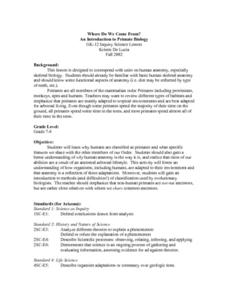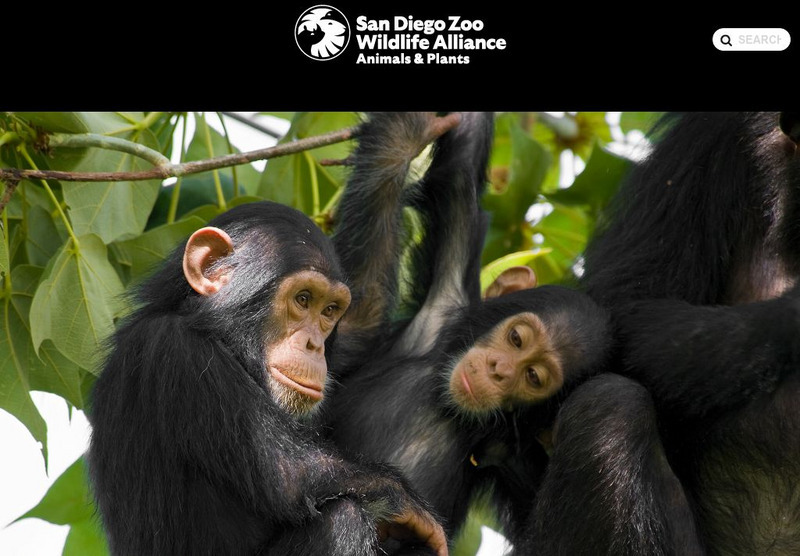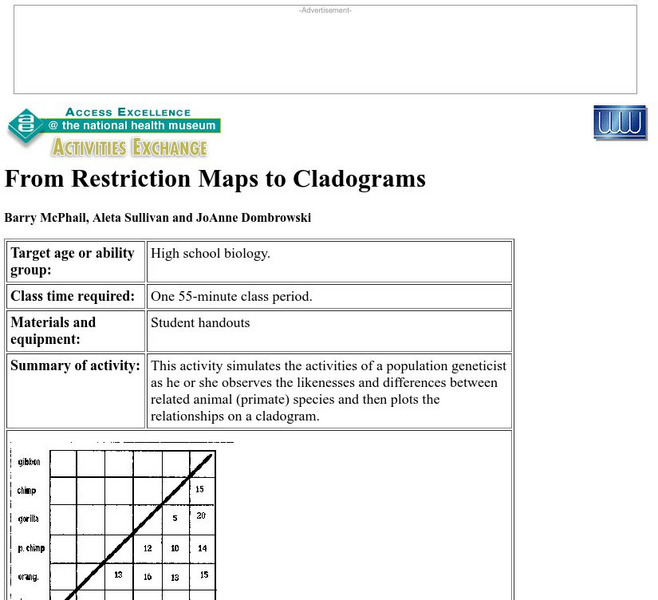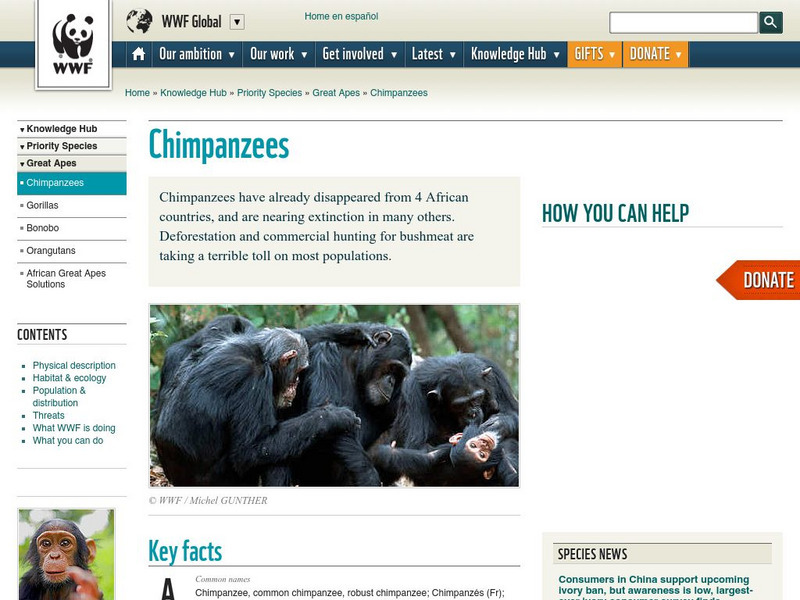Curated OER
Where Do We Come From? An Introduction to Primate Biology
Seventh graders explore skeletal biology. Through a discussion and video observation, 7th graders investigate how the anatomy is adapted to the environment. Students study primates and explore their characteristics and behaviors.
Curated OER
Apes To Man
Students study primates and their evolution history. In this role play lesson students view a video on evolution then demonstrate how primates walked and other observations they noticed in the film.
Curated OER
Ape Genius
Students watch a video and discuss the research on the intelligence of apes. In this primate lesson, students view a NOVA video about ape intelligence. They work in groups to take notes on the observations and conclusions of researchers...
Curated OER
Primate Evolution
In this evolution activity, students review 9 terms associated with the evolution of primates. Students place 6 terms into a crossword puzzle and 3 terms into fill in the blank statements.
Science Education Resource Center at Carleton College
Serc: The Opposable Thumb as a Human Adaptation: Thumb Taping Lab
Students conduct a short experiment to determine the importance of the opposable thumb by taping their thumb to render it useless while they proceed to do an everyday activity. In the end students will have the opportunity to reflect on...
Other
The American Society of Primatologists
The American Society of Primatologists is an educational and scientific organization that aims to understand non-human primates and to facilitate the exchange of information about them.
Smithsonian Institution
National Museum of Natural History: Zoo Labs
Five inquiry-based investigations designed for the observation of primates in a zoo setting. The labs ask guiding questions and list notable primate behaviors.
San Diego Zoo Global
San Diego Zoo: Chimpanzee
This resource provides detailed information about the chimpanzee, as well as several pictures and audio clips.
Globio
Glossopedia: Primates
Primates are a group of mammals that include apes, humans, monkeys, and prosimians. Primate characteristics and anatomy are explored, as well as life cycles, behavior and diet. Human impacts on other primate species have been...
University of Wisconsin
The Wisconsin Primate Research Center: Primate Info Net
Information about primates, includes links to primate centers and organizations. Find out about the International Directory of Primatology. Click into "Resources on Primatology" and then "About the Primates" to get to primate-specific...
Wikimedia
Wikipedia: Primate
Wikipedia offers several paragraphs of information on the term, "Primate," including a species chart and hyperlinked terms.
TED Talks
Ted: Ted Ed: How Smart Are Orangutans?
Along with humans, orangutans belong to the Hominidae family tree, which stretches back 14 million years. Lu Gao shares some amazing facts about these incredibly intelligent great apes from Asia. [4:33]
National Health Museum
Access Excellence: Molecular Biology/primate Phylogeny
This lesson plan involves comparison of amino acids to create a phylogenetic tree of primates. Students will also use other species information to draw conclusions about evolutionary relationships.
Smithsonian Institution
Smithsonian National Zoo: Zoogoer Magazine: Easy as 1,2,3
Rob Shumaker's article in Zoogoer Magazine focuses on a variety of primates, from orangutans to chimpanzees, and their responses to tests and procedures including the Boysens tests.
Smithsonian Institution
Smithsonian National Zoo: Zoogoer Magazine: The Question of Primate Language
Alex Hawes's article deals with a variety of topics related to primates language and communication skills. Several of the topics covered in the article include Animal Linguists, When Monkey Talks People Listen, Ape Bilinguists, and more.
Animal Fact Guide
Animal Fact Guide: Bonobo
Where in the world can you see a bonobo in the wild? This reference site features information not only on the habitat of the bonobo but also its physical characteristics, diet, breeding patterns, unique traits and behavior, conservation...
A-Z Animals
A Z Animals: Animal Facts: Orang Utan (Pongo Pygmaeus
Provides photographs and a fact card about the orangutan. Discusses where they are found, the two species types, physical characteristics and anatomy, distribution and habitat, behavior and lifestyle, life cycle, diet, predators,...
Lincoln Park Zoo
Lincoln Park Zoo: Western Lowland Gorilla
Use this site for information on the Western Lowland Gorilla. The information consists of special adaptations the gorilla has had to make, what it looks like, where it is found in the wild, what it likes to eats, and what its...
National Health Museum
Nhm: Restriction Maps to Cladograms Lesson
This lesson plan requires students to analyze DNA restriction maps to determine the differences in the sequence for several primates and humans. They then use the information to create a cladogram.
World Wildlife Fund for Nature
World Wildlife Fund: Chimpanzee
See what you can learn about Chimpanzees with this World Wildlife Fund information page.
American Museum of Natural History
American Museum of Natural History: Ruffed Lemur O Logy Card
OLogy cards are like virtual baseball cards about all kinds of science topics. This one is about the ruffed lemur and it contains information about the habitat, diet, and other ecological information. Make sure to read about the release...
Ducksters
Ducksters: Animals for Kids: Gorilla
Kids learn about the Gorilla, strong and intelligent African primate that is endangered.
Curated OER
Wisconsin Prc Logo
Information about primates, includes links to primate centers and organizations. Find out about the International Directory of Primatology. Click into "Resources on Primatology" and then "About the Primates" to get to primate-specific...



















